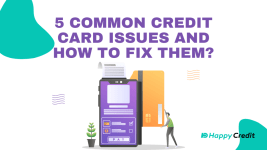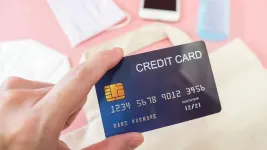5 Things to Do After a Credit Card Application Gets Declined [August, 2024]
Perhaps no other financial instrument makes financial transactions as rewarding as a credit card. Besides getting incredible cashbacks and discounts, you can use your credit card to make purchases without spending anything from your pocket. Moreover, you can get up to a month to repay the amount. However, you must fulfil the eligibility criteria to get a credit card. Although the eligibility criteria are quite relaxed, not all applicants get past the screening process, so they receive the ‘credit card application declined‘ message from the card provider.
If you have received the ‘credit card application declined’ message from your card provider or want to avoid such a message, this article is for you. Read on to know what you should do if your credit card application declines.
Why Do Card Providers Decline Credit Card Applications?
Card providers may decline credit card applications for multiple reasons, including the following:
- Poor Credit Score – The first factor lenders evaluate when approving credit card applications is the applicant’s credit score, a.k.a. CIBIL score. The chances of receiving the ‘credit card application declined’ message increase when your credit score is below 750.
- Low Income – Credit card providers also specify the minimum amount/income an applicant must earn every month to be eligible to apply for a credit card. If an applicant makes less than the stipulated amount, their credit card application declines.
- Multiple Cards – The chances of receiving the ‘credit card application declined‘ message increase if an applicant possesses numerous credit cards. This is because multiple cards increase an applicant’s debt-to-income ratio, and the higher the debt-to-income ratio, the lower the probability of getting credit card applications approved.
Now that you know the top reasons for receiving the ‘credit card application declined message,’ learn about the things you can do to increase the prospects of your credit card application approval.
5 Things to Do If Your Credit Card Application Gets Declined
Wait Before Applying Again
The worst mistake that credit card applicants make is applying for a new credit card soon after their first credit card application gets declined. Contrary to popular belief, the more you apply for credit cards, the higher the chances of rejection. Every time you apply for a credit card, your credit score takes a hit, and more credit card applications mean more desperation for credit. This makes the card providers cautious.
Hence, the first thing to do after receiving the ‘credit card application declined‘ message is to avoid applying for credit cards too quickly.
Read the Refusal Letter Carefully
Although credit card companies may take up to thirty (30) days to inform you that your credit card application has been declined, they usually do so earlier. The letter or email the credit card company sent specifies the reasons for rejection, such as a high amount of pending debt, a poor CIBIL score, inadequate monthly income, and the like. Whatever the reason for the denial, you must examine it thoroughly. For instance, increase your income before reapplying if your credit card application was declined due to low income. You may consider taking up a side hustle to increase your income.
Hence, the second thing you must do after receiving the ‘credit card application declined‘ message is read the rejection letter carefully and take the steps needed to increase the odds of approval.
Scan the Free Credit Report
The most common reason for declining credit card applications is poor credit scores. If your application gets denied for the same reason, you can request a free credit check/ report within sixty (60) days of receiving the rejection letter. After receiving the credit report, scan it thoroughly to spot any discrepancies. Sometimes, lenders delay reporting loan or card repayments, which decreases the applicant’s credit score. If you find such discrepancies in your credit report, bring it to the attention of the credit bureau immediately. After the credit bureau increases your score, you may ask the bureau to resend the report to the card provider, who will reconsider your credit card application.
Hence, the third thing you must do after receiving the ‘credit card application declined‘ message is to scan your free credit report and inform the credit bureau if you spot any discrepancy in your credit score calculation.
Negotiate With the Card Provider
This is the easiest to follow of the tips provided so far in this article. Credit card applicants often forget to declare all information considered pertinent by card providers. For instance, you may fail to include other income sources when mentioning your gross monthly income in the credit card application form. So, after receiving the ‘credit card application declined‘ message, evaluate your income sources and inform yourself of the actual amount, of which your salary income is a part.
Apply for a Secured Credit Card
Another foolproof way to increase the odds of card approval after receiving the ‘credit card application declined’ message is by applying for a secured credit card. Unlike standard credit cards that do not require collateral, secured credit cards are issued against fixed deposits or an upfront security amount in the applicant’s savings account.
When you apply for a credit card against your fixed deposit, the FD amount acts as collateral, meaning that the card provider will liquidate the FD if you do not pay your credit card bills. In contrast, if you regularly pay for twelve (12) months, the card provider may convert your card to an unsecured card and release the collateral.
Conclusion
Getting a credit card application declined‘ is not an uncommon occurrence. However, it would help if you immediately started taking appropriate actions after receiving such a message from the card provider. Follow the tips mentioned in this article to increase the odds of credit card approval.
FAQs
Q. Does my credit score decrease if my application for a credit card gets rejected?
Contrary to popular belief, applicants’ credit scores do not decrease when their credit card application is declined. However, when you submit a credit card application, it is considered a hard enquiry, which affects your credit score. So, you must wait a while before applying for a new credit card.
Q. Should I apply for a credit card immediately after rejection?
While there is no limit to how many times you can apply for a credit card after rejection, it is wise not to do so. Wait for at least six (6) months before reapplying.
Q. Why do credit card applications get declined?
Credit card applications may get declined for multiple reasons, such as low credit scores, low income, inaccurate details on the application form, and the like.
Q. Can I apply for a secured credit card after my credit card application gets declined?
Yes. Secured credit cards are more easily approved than unsecured credit cards. This is because, unlike unsecured credit cards, secured credit cards are issued against fixed deposits or an upfront security amount in the applicant’s savings account.

Product prices and availability are subject to change. Any price and availability information displayed on merchant's site at the time of purchase will apply to the purchase of these products. HappyCredit is a participant in the Amazon Services LLC Associates Program, an affiliate advertising program. As part of this program, we may earn commission from qualifying purchases made through the affiliate links provided on this website. We only promote products on Amazon that we genuinely believe are of high quality and value to our audience. The inclusion of affiliate links does not influence our editorial content or product recommendations. Our primary goal is to provide useful information and help you make informed purchasing decisions.
Certain portions of the text in this article might have been created using AI tools and subsequently edited by the author to improve the overall quality and clarity of the content for readers.
![5 Things to Do After a Credit Card Application Gets Declined [August, 2024] 5 Things to Do After a Credit Card Application Gets Declined [August, 2024]](https://happycredit.in/cloudinary_opt/blog/opt-kb2m6.webp)


















